What Makes Telco Subscribers Act on Security?

Many Internet users In the US, Germany, France, and Italy are concerned about their security online, as evidenced by the results of our annual Cybersecurity Perceptions Survey 2021.
For the latest cybersecurity reports and insights, visit our ISP security services hub.
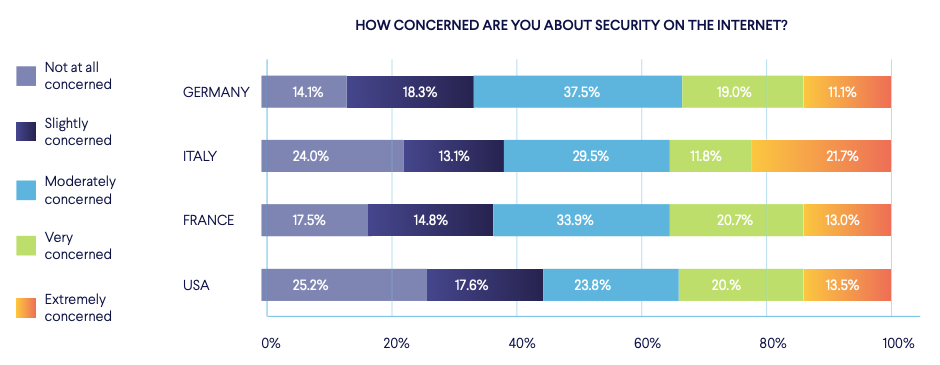 But do Internet subscribers act on their cybersecurity concerns? Yes, a significantly higher percentage of concerned people take action to protect their home networks and devices, when compared to the general population of Internet users. Some are even willing to upgrade their Internet subscriptions or even switch to a different Internet Service Provider (ISP) if it offered them a more secure connection. In this overview, I will present some distinct factors that correlate to users taking action to protect their networks, and I’ll start by talking about Internet users who are using security solutions provided by their ISP.
But do Internet subscribers act on their cybersecurity concerns? Yes, a significantly higher percentage of concerned people take action to protect their home networks and devices, when compared to the general population of Internet users. Some are even willing to upgrade their Internet subscriptions or even switch to a different Internet Service Provider (ISP) if it offered them a more secure connection. In this overview, I will present some distinct factors that correlate to users taking action to protect their networks, and I’ll start by talking about Internet users who are using security solutions provided by their ISP.
Who Uses ISP Security Solutions
The largest number of people using ISP security products is in the US, around 17%. Germany, France, and Italy have a smaller adoption rate: 7.8%, 11.5%, and 7.9%, respectively. This might be due to European telcos currently offering fewer security products than their US counterparts. 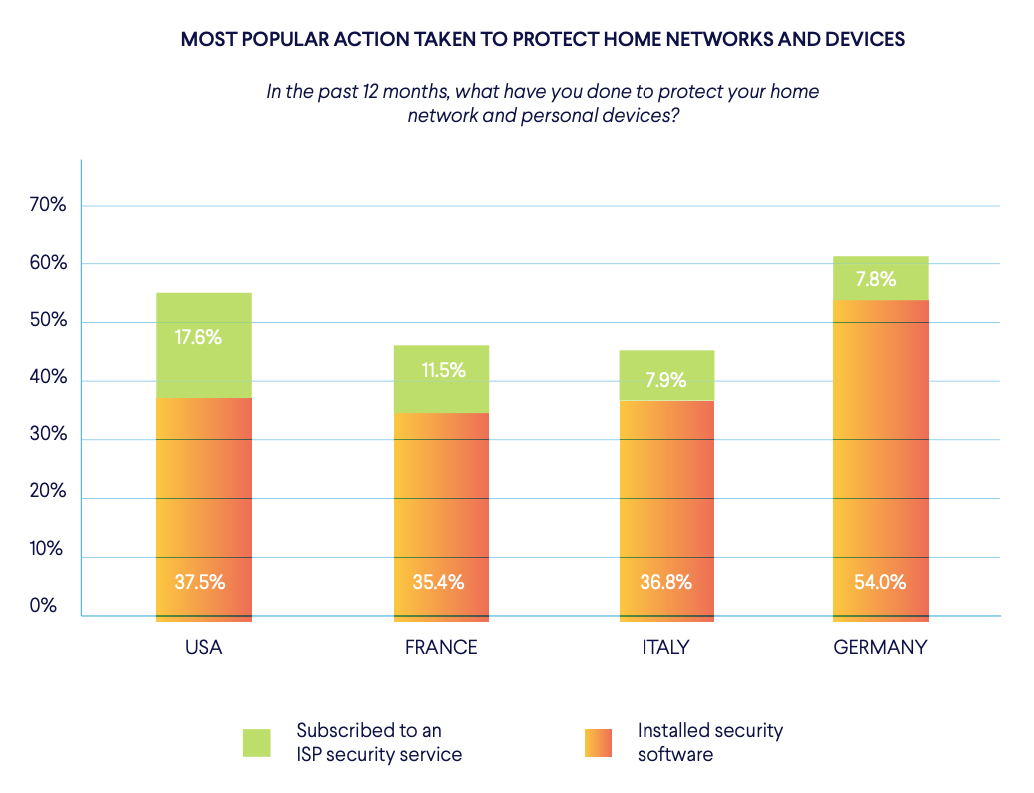 People were more likely to use ISP security solutions if they felt that home network and personal device security was difficult. The number of people who found it at least moderately difficult ranged from 48% in the US to over 60% in Europe. This shows that ISP security products like CUJO AI Sentry have a large base of potential customers in all surveyed countries.
People were more likely to use ISP security solutions if they felt that home network and personal device security was difficult. The number of people who found it at least moderately difficult ranged from 48% in the US to over 60% in Europe. This shows that ISP security products like CUJO AI Sentry have a large base of potential customers in all surveyed countries. 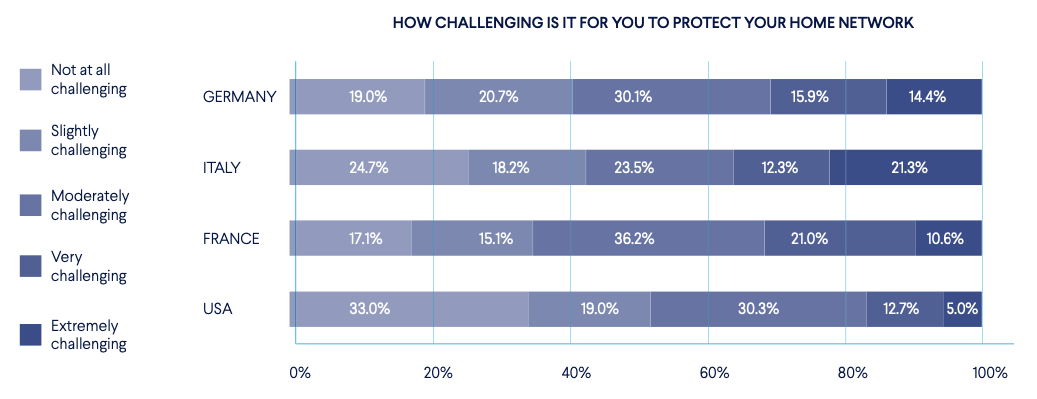 The largest segment of respondents who use ISP security solutions across all countries were those who felt that protecting their networks and devices was very (or extremely) difficult. Nevertheless, even those who felt that cybersecurity was not difficult at all used ISP security, albeit not as frequently. This might be grounds for further research into the relations between using ISP security solutions and growing confidence in the person’s cybersecurity abilities. As I mentioned in the introduction, people who were more concerned about online security were more likely to use security solutions. In all countries, the majority of Internet subscribers felt at least moderately concerned about their security on the Internet.
The largest segment of respondents who use ISP security solutions across all countries were those who felt that protecting their networks and devices was very (or extremely) difficult. Nevertheless, even those who felt that cybersecurity was not difficult at all used ISP security, albeit not as frequently. This might be grounds for further research into the relations between using ISP security solutions and growing confidence in the person’s cybersecurity abilities. As I mentioned in the introduction, people who were more concerned about online security were more likely to use security solutions. In all countries, the majority of Internet subscribers felt at least moderately concerned about their security on the Internet. 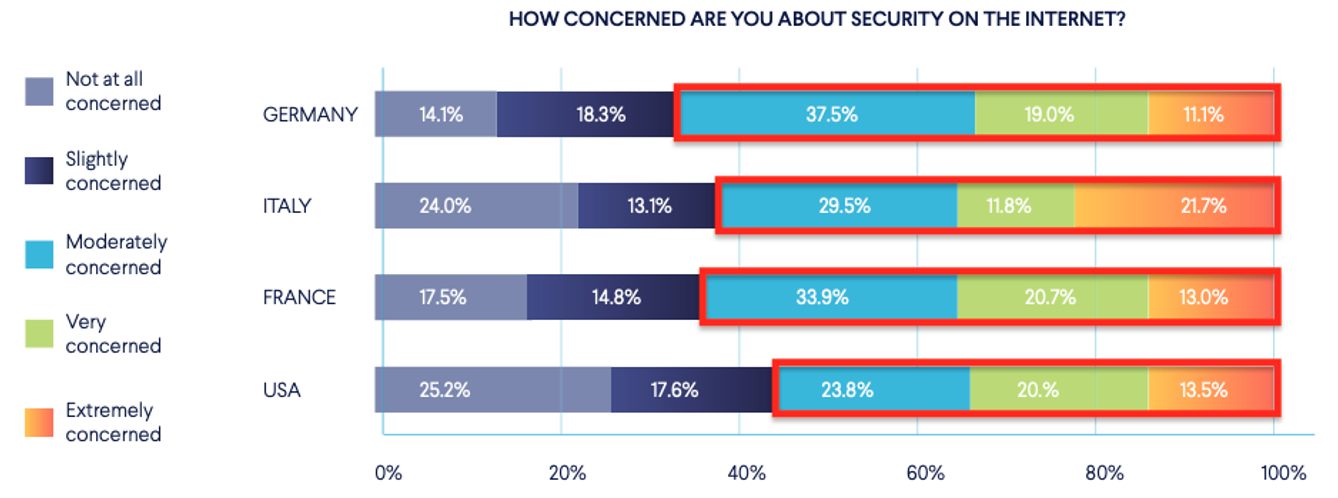 Another key factor to consider is that not all ISPs offer security solutions, which might be the largest opportunity for ISP value-added services, user acquisition, and higher revenues in a decade. The section below examines subscriber willingness to upgrade their subscription or switch to another ISP if it offered them more security.
Another key factor to consider is that not all ISPs offer security solutions, which might be the largest opportunity for ISP value-added services, user acquisition, and higher revenues in a decade. The section below examines subscriber willingness to upgrade their subscription or switch to another ISP if it offered them more security.
Many Subscribers Would Switch ISPs or Upgrade Plans for More Security
We asked people whether they’d upgrade their Internet subscription if their provider offered a more secure connection. Across all countries, significant numbers of respondents told us that they would be willing to upgrade, and some would pay more for the service. 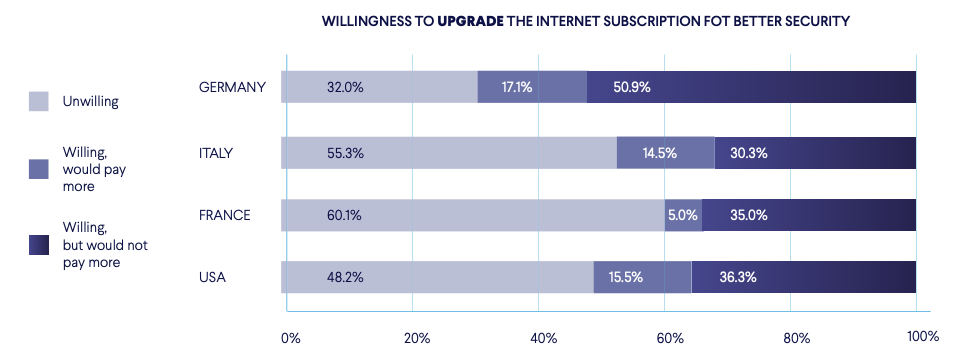 As you can see from the chart above, there are great opportunities for network service providers across all surveyed countries to increase their revenues and offer a service their customers actually want. Furthermore, we asked whether people would switch to a different ISP if it offered a more secure connection, and similar numbers of respondents across all countries told us they would switch over to a new provider. Again, a significant number said they would pay more for the added security.
As you can see from the chart above, there are great opportunities for network service providers across all surveyed countries to increase their revenues and offer a service their customers actually want. Furthermore, we asked whether people would switch to a different ISP if it offered a more secure connection, and similar numbers of respondents across all countries told us they would switch over to a new provider. Again, a significant number said they would pay more for the added security. 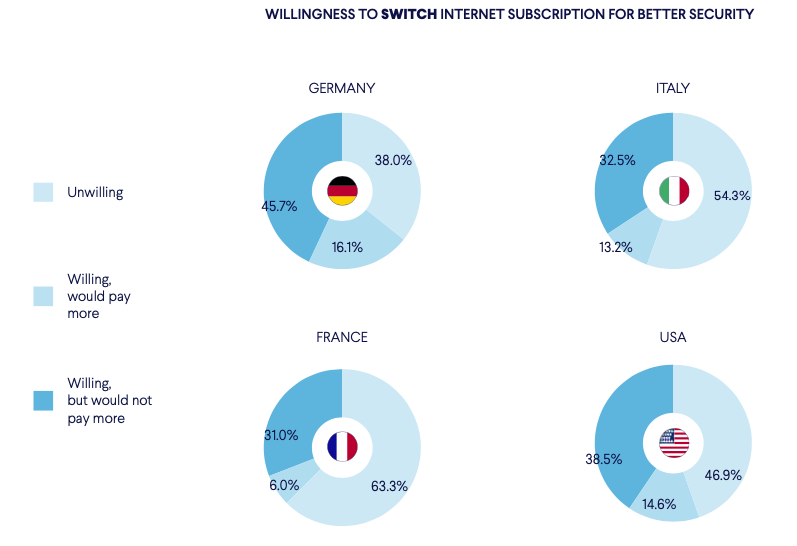 Lastly, I’ll review the perceptions of people who used traditional security measures.
Lastly, I’ll review the perceptions of people who used traditional security measures.
Who Uses Security Software
Germany led our survey with the highest percentage (54%) of respondents who claimed to use security software on their devices. France, Italy, and the US trailed the Germans with 35.4%, 36.8%, and 37.5%, respectively. 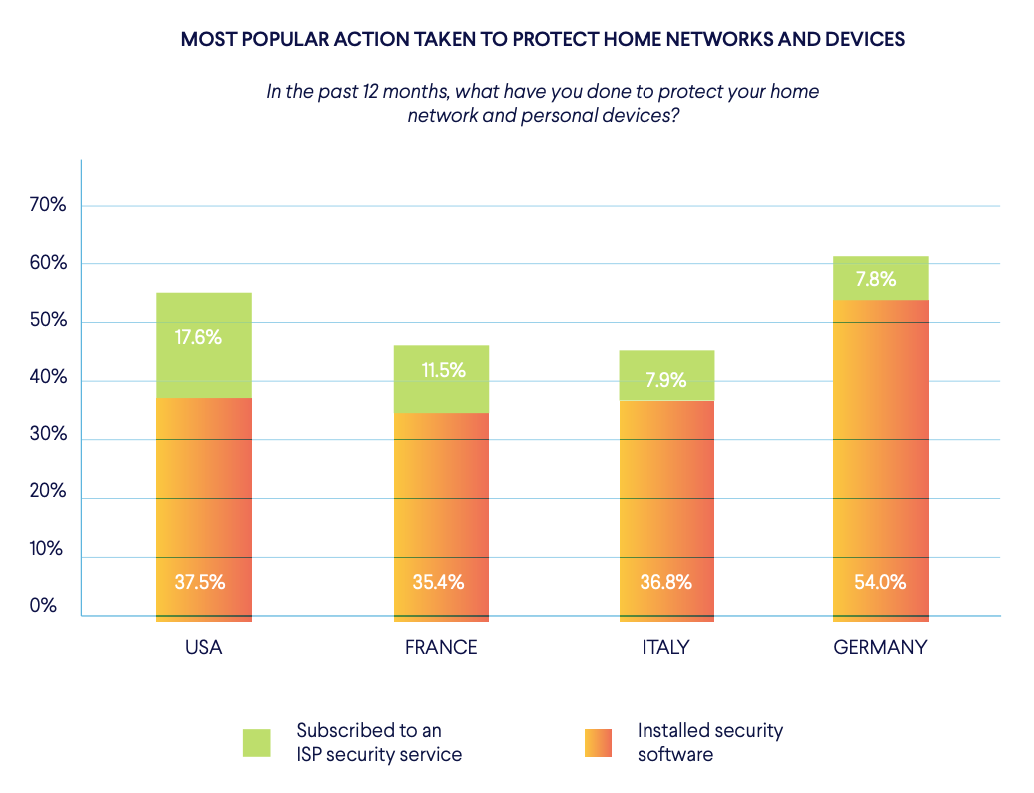 Use of security software also correlated to the concernedness for online security. Nevertheless, this might also show a growing gap in the consumer cybersecurity landscape, as most traditional security software solutions do not protect all smart devices and IoT appliances. Our survey has shown that smart device use is extremely common, with over 40% of households in the US, as well as around 20% in Germany, France, and Italy having smart devices.
Use of security software also correlated to the concernedness for online security. Nevertheless, this might also show a growing gap in the consumer cybersecurity landscape, as most traditional security software solutions do not protect all smart devices and IoT appliances. Our survey has shown that smart device use is extremely common, with over 40% of households in the US, as well as around 20% in Germany, France, and Italy having smart devices. 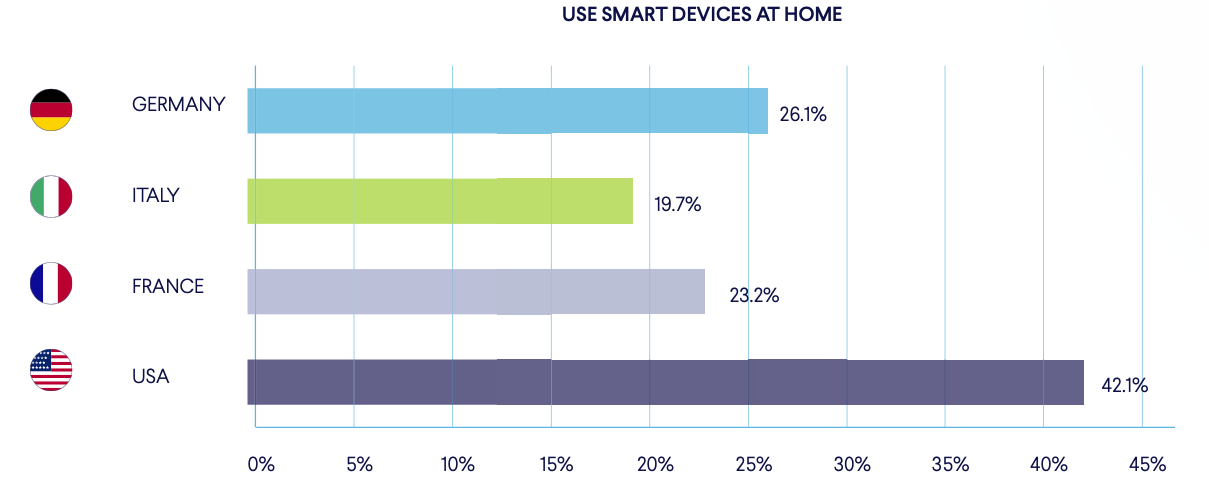
What Drives Telco Subscribers to Act on Security?
Our data clearly showed that around half of the Internet users do not act on protecting themselves online. Their perceived abilities to protect their networks and devices was not a determining factor in terms of acting on cybersecurity –concerns were a more important factor for action than perceived technical abilities. If you are researching ISP security solutions and want to try out the largest AI-driven network protection solutions, read up on CUJO AI Sentry and contact us for a demo. Download our full report for more data on consumer cybersecurity perceptions.
